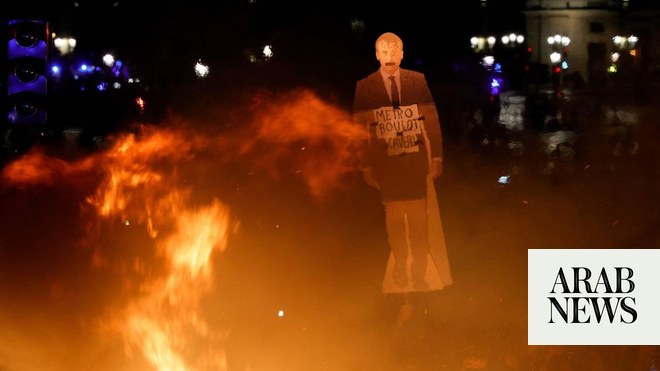
PARIS: Paris tourist sites reopened, workers cleaned up broken glass and shop owners tried to put the city on its feet again Sunday, a day after running battles between “yellow vest” protesters and police that left at least 71 injured in the French capital and caused widespread damage in cities around France.
The man at the focus of protesters’ anger, President Emmanuel Macron, broke his silence to tweet his appreciation for the police overnight. However, pressure mounted on him to propose new solutions to calm the anger dividing France.
Macron will address the nation “at the very beginning of the week,” government spokesman Benjamin Griveaux said Sunday, without specifying a day.
The economy minister lamented the damage to the economy.
“This is a catastrophe for commerce, it’s a catastrophe for our economy,” Bruno Le Maire said Sunday while visiting merchants around the Saint Lazare train station, among areas hit by vandalism as the pre-Christmas shopping season got underway.
After the fourth Saturday of nationwide protests by a grassroots movement with broadening demands officials said they understood the depth of the crisis. Le Maire said it was a social and democratic crisis as well as a “crisis of the nation” with “territorial fractures.”
Griveaux, the government spokesman, speaking on LCI TV station, said he was “sure (Macron) will know how to find the path to the hearts of the French, speak to their hearts.”
The president must also speak to their pocketbooks. Among myriad demands voiced by protesters, measures to increase buying power were a bottom line.
The number of injured in Paris and nationwide was down Saturday from protest riots a week ago, and most of the capital remained untouched. Still, TV footage broadcast around the world of the violence in Paris neighborhoods popular with tourists has tarnished the country’s image.
A number of tourists at the Eiffel Tower, which reopened Sunday after closing Saturday, said they were avoiding the Champs-Elysees, Paris’ main avenue that is lined with shops and cafes and normally a magnet for foreign visitors.
“Yes, we’re very concerned with security ... but we couldn’t cancel the trip,” Portuguese tourist Elizabet Monteero said. But, she added, “We don’t go to dangerous zones like the Champs-Elysees.”
France deployed some 89,000 police but still failed to deter the determined protesters. Some 125,000 yellow vests took to the streets Saturday around France with a bevy of demands related to high living costs and a sense that Macron favors the elite and is trying to modernize the French economy too fast.
Some 1,220 people were taken into custody around France, the Interior Ministry said Sunday — a roundup the scale of which the country hasn’t seen in years. French police frisked protesters at train stations around the country, confiscating everything from heavy metal petanque balls to tennis rackets — anything that could be used as a weapon.
Most of the yellow vest demonstrators in Paris appeared to be working class men from elsewhere in France, angry at economic inequalities and stagnation.
Thierry Paul Valette, who helps coordinate yellow vest protesters who come to Paris, said the president must announce concrete measures to quell the fury.
It won’t be enough to announce negotiations, he said in an interview with The Associated Press. People want change and “concrete, immediate, right now” measures.
Even if Macron withdraws his signature slashing of the wealth tax, “half of the yellow vests will go home, the other half will want him to resign and will stay in the streets,” Valette predicted. “Because the movement isn’t controllable.”
Wind and rain pummeled Paris overnight, complicating efforts to clean up debris left by protesters, who threw anything they could at police and set whatever they could on fire. Protesters ripped off the plywood protecting Parisian store windows and threw flares and other projectiles. French riot police repeatedly repelled them with tear gas and water cannon.
Parisians lamented the damage.
“What happened yesterday and the Saturday before, it was unforgettable,” said Jean-Pierre Duclos. “It happened in a country like France that supposed to be sophisticated, it’s unbearable and it cannot be forgiven.”
Police and protesters also clashed in other French cities, notably Marseille, Toulouse and Bordeaux, and in neighboring Belgium. Some protesters took aim Saturday at the French border with Italy, creating huge traffic jams. Some 135 people were injured nationwide, including the 71 in Paris.
Seventeen of the injured were police officers. Jean-Claude Delage of the Alliance police union urged the government on Sunday to come up with responses to France’s “social malaise.” He told BFM television that working-class protesters were deliberately targeting high-end shops in Paris that were selling goods they never afford.
Saturday’s protests were a direct blow to Macron, who made a stunning retreat last week and abandoned the fuel tax rise that initially prompted the yellow vest protest movement a month ago.
Macron’s turnaround damaged his credibility with climate defenders and foreign investors and earned derision from US President Donald Trump, an opponent of the 2015 Paris climate change accord that Macron has championed worldwide.
Yet it did nothing to cool tempers of the “gilets jaunes,” the nickname for crowds wearing the fluorescent yellow vests that all French motorists must keep in their cars.
The disparate movement now has other demands, from taxing the rich to raising the minimum wage to having the 40-year-old Macron, a former banker and economist, hand in his resignation.












